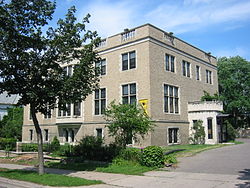Hennepin History Museum
 | |
 | |
| Established | 1957 |
|---|---|
| Location | 2303 Third Avenue South, Minneapolis, Minnesota, USA |
| Coordinates | 44°57′36.48″N 93°16′20.86″W / 44.9601333°N 93.2724611°W |
| Curator | Jack Kabrud |
| Website | hennepinhistory.org |
Hennepin History Museum is a museum dedicated to the history of the land and people of Hennepin County, Minnesota. The museum traces its roots back to the founding of the Hennepin County Territorial Pioneers Association in 1858.[1] The museum provides in house exhibits as well as "special delivery" programs that bring museum artifacts and programming to schools and other locations.
Location
The museum is located in the Whittier neighborhood of Minneapolis, just a few blocks away from the Minneapolis Institute of Arts. The museum is located in the George Christian house, a historic mansion built in 1919 in what was then the Washburn-Fair Oaks Mansion District of Minneapolis.[2]
Exhibits
The museum showcases a mixture of permanent and rotating exhibits. Permanent exhibits include 'The Century of the Child,' an exploration of growing up in Hennepin County, and 'Curiosities and Remnants,' a collection of objects of general historical interest from the county.[3]
Current exhibits include 'The League of Women Voters, A Look Back and Forward,' which details the history of the Minnesota League of Women Voters as it grew from the Minnesota Woman Suffrage Association.[4]
The museum often showcases the work of local contemporary artists. Past exhibits include paintings by local artist Bettye Olsen and a retrospective on the life and work of cake artist Rosalie Laboe.[5][6] In 2007, the museum invited photographer Timothy Pitrowski to photograph dresses from their collection on modern models.[7] Some exhibits explore the quirkier side of local history. One former exhibit, entitled 'Cat Gut is Not Our Friend' explored medical implements, drugs and treatments used in the early days of the county.[8] Exhibits like 'A Century of Women's Aprons' focus on classic pioneer themes, while other exhibits such as 'Icons of the Bereaved: Tradition and Artifacts of Mourning' have a more modern focus.[9]
Community
The museum is home to a wide variety of events, including their monthly "Fireside Chats" on various historical topics.[10]
However, the museum also offers more avant-garde events as well, such as "Naked Girls Reading," an event in which naked women read literary classics to clothed audiences.[11]
The museum has also worked to spotlight various communities in Hennepin County. In 2003, the museum partnered with the Walker Art Museum and 30 East African students from local high schools to use letters and photographs to create an exhibit about East African communities in Minneapolis.[12] The museum's cultural outreach continued in 2009, when University of Minnesota interior design students exhibited designs for culturally sensitive homes for Somali and Mexican immigrants[13]
Library
The museum's library is open to the community and highlights the museum's archival collections, managed by archivist Susan Larson-Fleming. The library contains photos, letters, and ephemera relating to local history.[14]
Funding
About 70% of the museum's annual budget of $250,000 is funded by Hennepin County. The remaining 30% is funded by entrance fees and the museum's 800 members. Recently, the economic downturn has had a negative impact on member gifts, and on the museum's finances.[15]
Magazine
Three times a year, the museum publishes Hennepin History Magazine.[16] Each issue includes a "From the Director's Chair" column written by the museum director, followed by three or four essays on various historical topics. Sample topics include "The Birth of Target",[17] which explores the history of the Target Corporation, placing it in a historical context with the Dayton family and their department store Daytons. Such examinations of local companies are common in the magazine; the Winter 2012 issue explored Northwest Airlines in the 1930s.[18]
See also
References
- ^ "About the Museum". Hennepin History Museum. Retrieved 3 March 2013.
- ^ "George Christian Mansion". Placeography. Retrieved 3 March 2013.
- ^ "Now on View". Hennepin History Museum. Retrieved 3 March 2013.
- ^ "League of Women Voters A Look Back and Forward". Hennepin History Museum. Retrieved 3 March 2013.
- ^ "My Own Environment". Hennepin History Museum. Retrieved 3 March 2013.
- ^ Kim Ode (6 June 2012). "When Cooking: Eat Local Farm Tour. Also: Laboe takes the cake and MOA gets jerky". Star Tribune.
- ^ "1870s Day Dresses". MNArtists. Retrieved 3 March 2013.
- ^ "Museum Spotlight Hennepin History". CBS News. Retrieved 3 March 2013.
- ^ "Hennepin History Museum". Minnesota Monthly. Retrieved 3 March 2013.
- ^ "Fireside Chats". Hennepin History Museum. Retrieved 3 March 2013.
- ^ Jahna Peloquin (30 December 2012). "Naked Girls Reading Makes a Classy Debut". vita.mn. Retrieved 1 March 2013..
- ^ "Hennepin History Museum Spotlights New East African Neighbors". South Side Pride. Retrieved 3 March 2013.
- ^ Kim Palmer (3 February 2009). "The Culture of Home". Star Tribune.
- ^ "Museum Library and Collections". Hennepin History Museum. Retrieved 3 March 2013.
- ^ "Tough Times for Local Historical Societies". Bethel History. Retrieved 3 March 2013.
- ^ "Hennepin History Magazine". Hennepin History Museum. Retrieved 3 March 2013.
- ^ Dayton, Bruce; Green, Ellen (2012). "The Birth of Target". Hennepin History. 71 (2). E.B. Green Editorial: 20.
{{cite journal}}:|access-date=requires|url=(help) - ^ Johnson, Frederick (2012). "Fly Northwest circa 1932". Hennepin History. 71 (1). E.B. Green Editorial: 10.
{{cite journal}}:|access-date=requires|url=(help)
